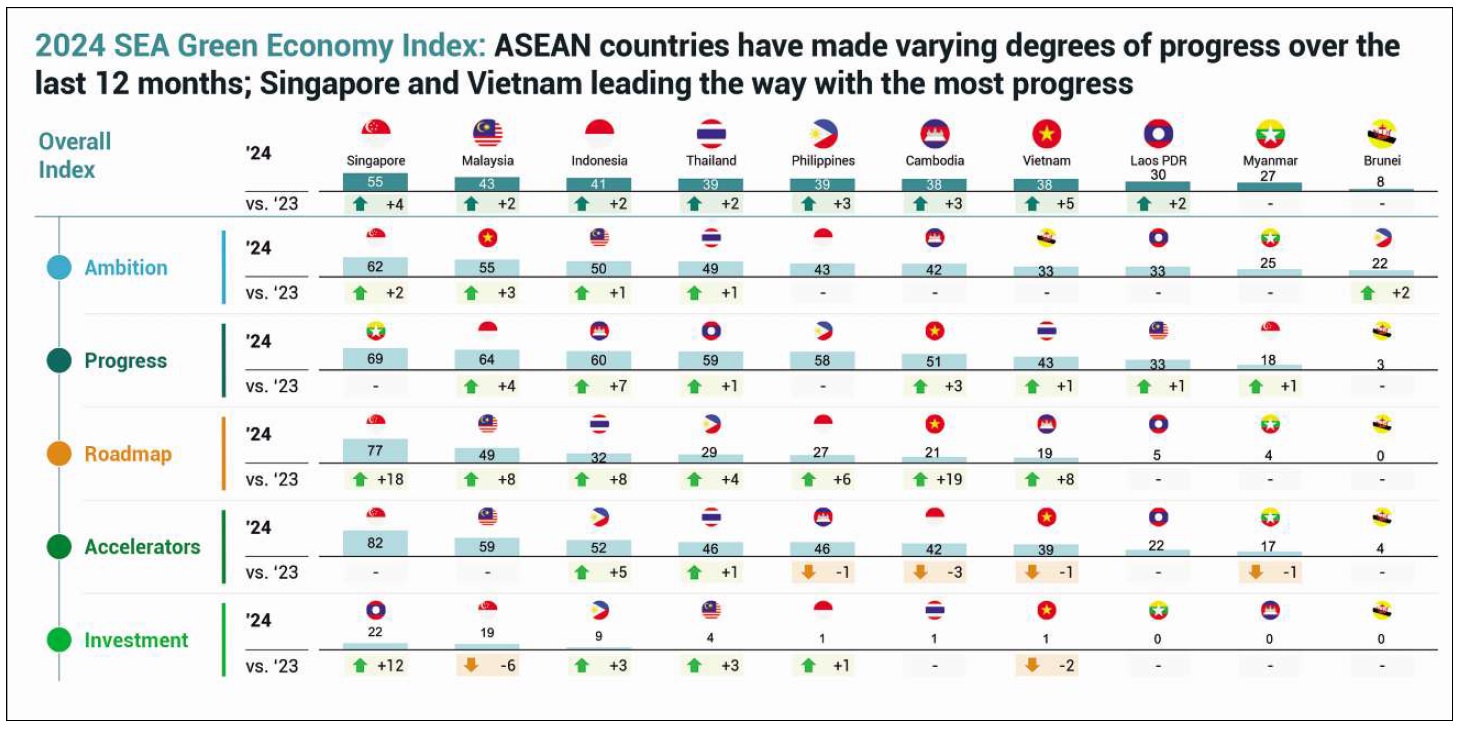
Be aware: Progress, Roadmap, Accelerators are assessed based mostly on related indicators at each nation and sector degree
Sources: Nation NDC; LT-LEDS; Local weather Watch; BMI; IRENA; BNEF; FAO; World Forest Watch; Euromonitor; AVCJ; S&P Capital IQ; Preqin; Pitchbook; Business participant interviews; Lit. search; Bain evaluation
MANILA, Philippines —Through the years, the Philippines has made vital progress in advancing the power and inexperienced transition agenda however there may be nonetheless a lot floor to cowl.
The primary-ever Southeast Asia Inexperienced Financial system Index confirmed that the nation ranked fifth amongst its regional friends, in accordance with the report entitled “Southeast Asia’s Inexperienced Financial system 2024–Shifting The Needle” collectively revealed by Bain & Firm, GenZero, Customary Chartered, and Temasek.
Based mostly on the report, the Philippines achieved the very best rating when it comes to funding as many corporations poured in extra money to assist attain a inexperienced financial system for future generations. However the nation recorded the bottom rating in ambition, that means that the federal government has but to current a blueprint to appreciate its decarbonization targets.
Up to now, the nation has neither offered a concrete plan nor professed dedication to achieve a “web zero” goal though sure entities, notably massive firms, took the initiative to cut back their respective carbon emissions.
The report says that amid the absence of sector-specific emissions targets, 4 main emitting corporations spelled out their net-zero and emissions targets.
‘Unconditional and conditional’ targets
Additional, the report famous that the federal government outlined “unconditional and conditional” targets. The primary is to slash economy-wide greenhouse gasoline emissions by 75 p.c for the interval 2020 to 2030 underneath its up to date Nationally Decided Contribution goal. The opposite goal is to extend renewable power’s share within the power combine to 35 p.c by 2030 and lift it additional to 50 p.c by 2050.
READ: Photo voltaic funding outstrips all different energy types: IEA
As of final 12 months, coal-fired energy crops stay the main supply of power throughout the archipelago, accounting for 43.9 p.c of the facility technology combine whereas renewables got here second with a share of 29.7 p.c.
Even with out sector-specific emissions targets or the sluggish uptick of renewables, the report acknowledged the strides made by the Philippine authorities to permit extra overseas corporations to spend money on the native renewable area.
In 2022, the Division of Vitality issued the revised implementing guidelines and rules of the Renewable Vitality Act that successfully eliminated the overseas possession restriction on tasks geared toward harnessing cleaner sources of power. Earlier than this, a overseas agency’s possession stake was capped at 40 p.c.
A 12 months later, in 2023, President Marcos issued Govt Order No. 18 to create “inexperienced lanes” for strategic investments. Primarily, the directive is geared toward expediting the processing of permits, licenses, certifications and/or authorizations required by a enterprise enterprise to undertake essential funding tasks.
The Division of Vitality stated earlier the moratorium on the event of greenfield or new coal-fired energy tasks stays in impact. The company first introduced the ban in 2020 as a part of efforts to advertise the usage of non-conventional sources of power. The directive excludes coal services with agency enlargement plans or indicative tasks with substantial accomplishments.
‘Inexperienced investments’ up 57%
The report additionally took notice of the 57-percent rise in personal inexperienced investments, reaching $1.5 billion within the earlier 12 months due to the “enhance in home investments in infrastructure.” Nevertheless, it represents a small fraction of the required capital funding of $16.6 billion to advance the push for a inexperienced financial system.
READ: Important enhance in renewable power investments seen
“Important enhance in waste administration funding, whereas funding momentum continues in [the] photo voltaic sector in 2023,” the report says. “Constructive efforts have been seen in blended finance and new regional collaboration efforts in direction of coal phase-out.”
On a regional degree, the report acknowledged the “various levels of progress” of the Southeast Asian area in pushing the decarbonization plan within the final 12 months, with Singapore and Vietnam “main the best way.”
“Eight out of 10 nations have web zero targets, and whereas they’ve remained the identical because the earlier 12 months, greater than half of the area’s high emitting corporates have set web zero or emission discount targets, 15 extra in comparison with 2023,” a press launch on the report says.
“As well as, seven nations have proven progress in adopting renewable power and electrical autos, preserving forestland, and enhancing [the] well being of cropland soil,” it provides.
Discovering the stability
To veer away from fossil fuels, the report says Southeast Asia as a rising financial system wants to search out the stability between financial development and transition to renewable power. Kimberly Tan, Head of Investments at GenZero, says an funding of $1.5 trillion is required to achieve emissions targets by 2030.
The inexperienced financial system index assessed the ten Southeast Asian nations based mostly on the next—ambition (20 p.c), progress (25 p.c), highway map (20 p.c), accelerator (25 p.c) and funding (10 p.c).
The index coated Brunei, Cambodia, Indonesia, Laos, Malaysia, Myanmar, the Philippines, Singapore, Thailand and Vietnam.
“The index helps present an goal snapshot of how every nation is performing year-on-year and relative to friends. It reveals an summary of areas they’re doing properly and acknowledges the place progress is being made,” says Dale Hardcastle, director of World Sustainability Innovation Heart at Bain & Firm.

